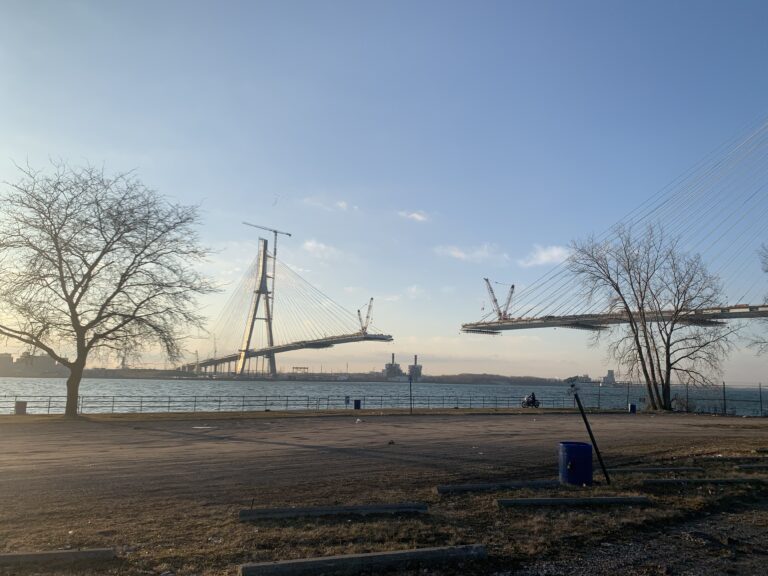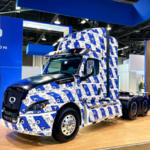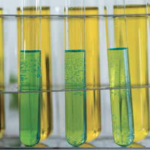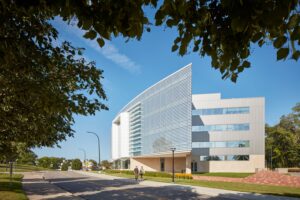
- Kim Kisner
- Business
- 03/05/2024
How the Gordie Howe International Bridge Impacts the Port of Detroit’s Decarbonization Efforts

Nine months ago the Port of Detroit launched a decarbonization project aiming to reduce its environmental impact and improve air quality. The project – in partnership with Tunley Environmental and Southwest Detroit Environmental Vision (SDEV) – involves a range of initiatives, beginning with a full assessment of the port’s current fossil fuel emissions.
Concurrently, the construction of the Gordie Howe International Bridge is well underway, due to be completed in September 2025, which has many implications involving sustainability in Southwest Detroit.
SBN Detroit interviewed, Mark Schrupp, executive director of the Detroit/Wayne County Port Authority, to get an update on the decarbonization efforts and obtain some insights on how those efforts overlap with the bridge development and the future of air quality and sustainability in that area.
Q: We last spoke in August, at which time you were just launching the decarbonization project. Where does it stand now?
A: The baseline assessment of the carbon footprint of the Port of Detroit is near completion. This is a significant milestone. We have measured all emissions of bringing materials into the port, including equipment used to move materials, emissions from tugboats, and ships, and broke it down by terminal and operator. Next, we’ll lay out plans for eliminating that footprint over the next twenty years.

Q: What will initial strategies involve?
A: Most of our focus will be on diesel. Ships and heavy equipment operate on diesel and the quickest fastest way to reduce emissions is to convert to biodiesel. We are pushing hard for that.
The long-term solution may be hydrogen, but this involves major upgrades and renovations to the vehicles and ships, and the infrastructure.
In the meantime, we can reduce carbon emissions by 14% to 15% by switching to a biodiesel blend right away. This will have immediate impacts on global warming and air quality.
Q: Is the use of electricity an option?
A: It’s not a good option. The heavy-duty equipment used in the port region would need massive batteries to power them, and there are just not a lot on the market today.
All U.S. ships that operate in the Great Lakes are being encouraged to convert to biodiesel. Canadian ships are already switching to B20 and higher blends. This will help when ships are docked and running on generators.
Q: How does this intersect with the development of the Gordie Howe International Bridge and the use of diesel and biodiesel in heavy-duty trucks?

A: The significant increase in truck traffic in Southwest Detroit makes it more likely to get funding to convert those trucks to hydrogen or biodiesel. The concentration of diesel fuel in this region makes a strong case for that. The switch to biodiesel would help immensely, as the heavy equipment used in the ports can run on that too. It would have a massive impact on the air quality.
The challenge is getting enough biodiesel supply. It is a supply and demand issue. Also, without government incentives, biodiesel costs more than regular diesel. Other states have implemented tax credits or financial incentives to the producers, and a mandate for the users, creating a carrot and a stick scenario. What is needed is legislation to create funding to increase the supply and incentives to bring down the cost.
Canada has created a penalty in the shipping industry for those who don’t use biodiesel.
In the Port of Detroit, there is one fuel company – Waterfront Petroleum – that supplies the fuel for most ships. That company has received some funding and is ramping up its ability to provide biodiesel for the ships in reaction to this Canadian penalty. We are working to help them secure funding, etc.
At the same time, we are helping to educate ship owners on using biodiesel. There are some extra filter changes and small operational things that need to be done to get the most from the fuel. Industry players promoting this to help ship and truck owners understand how to use it.
Q: Overall, do you think the development of the bridge is a negative or positive for the port?
A: The bridge has driven up prices on land in the area. One of the projects we are working on is to extend a rail line to the waterfront for a private partner, and the prices for land to run that rail line have gone up because of speculation around the bridge.
But it will have a positive impact on our region in terms of manufacturing. The bridge will help keep Detroit as the epicenter of most of the automobile production. If auto manufacturing remains strong, those sectors will need more raw materials that flow through the port. This will be bolstered by the bridge because it will make the movement of goods more efficient. This will ultimately have a ripple effect on our economy – for the positive.
We are also looking at ways we can leverage the bridge to help make the port of Detroit more of an intermodal hub for finished goods and other kinds of goods.

For example, instead of big ships unloading on the coast in Quebec or New York and then putting materials on trains to reach our region maybe having the bridge makes Detroit/Windsor a better destination for those shippers to reach midwestern customers. We are still researching this. The challenge is that the really big ships can’t get into the Great Lakes. But we are looking at ways to be more efficient with smaller ships and other solutions. The idea is ultimately to take some of the railroad traffic off the East Coast rail lines and get the goods closer to the customer.
Q: What are the next steps in terms of your decarbonization project?
A: We are planning a community event to showcase the process and planning and next steps. We are really pleased with the work and collaboration efforts involved in this project and are looking forward to sharing it with the community.
We are also in a grant-seeking phase to secure funding to switch out some of our heavy-duty equipment
We submitted a project concept through SEMCOG and the state of Michigan to fund the biodiesel concept as well as a hydrogen pilot program to develop a hydrogen fuel station in the port region along with a creative hydrogen fuel truck model.
Further, we have submitted additional ideas to replace gas-powered outboard motors on law enforcement vessels with battery electric motors, develop a hydrogen fueling and truck station in the port region, and integrate battery-powered forklifts in one of the terminals.
Be sure to subscribe to our newsletter for regular updates on sustainable business practices in and around Detroit.
Kim Kisner
- All
- Business
- Community
- Education
- Events

ZF Group, a global technology company with its North American headquarters in Northville, specializes in systems for passenger cars, commercial vehicles, and industrial technology. With a focus on next-generation mobility, the company develops solutions that address electrification, automation, and digitalization while aiming to improve safety, efficiency, and sustainability in transportation. SBN Detroit interviewed Anuj Shah, Sustainability Lead, for the Americas, to explore the most pressing environmental challenges in...

The Chip Bag Project, based in Detroit, is a sustainability initiative that upcycles hard-to-recycle snack packaging — particularly chip bags — into insulated sleeping bags for individuals experiencing homelessness. Founded by Eradajere Oleita, the project addresses both environmental waste and housing insecurity by transforming materials like Mylar into practical, thermally efficient solutions. In June, Oleita was among Trelllis’s 30 Under 30, its annual recognition of the brightest young...

PowerPanel, headquartered in Oxford, focuses on sustainable energy technology with a particular emphasis on hot water systems and thermal energy capture. The company designs and manufactures modular solar hybrid systems that integrate both photovoltaic and thermal components into a single unit. Its goal is to offer energy solutions that are more efficient, durable, and economically viable for a range of commercial and industrial applications. SBN Detroit interviewed Garth...







